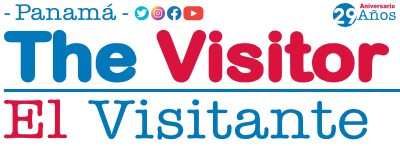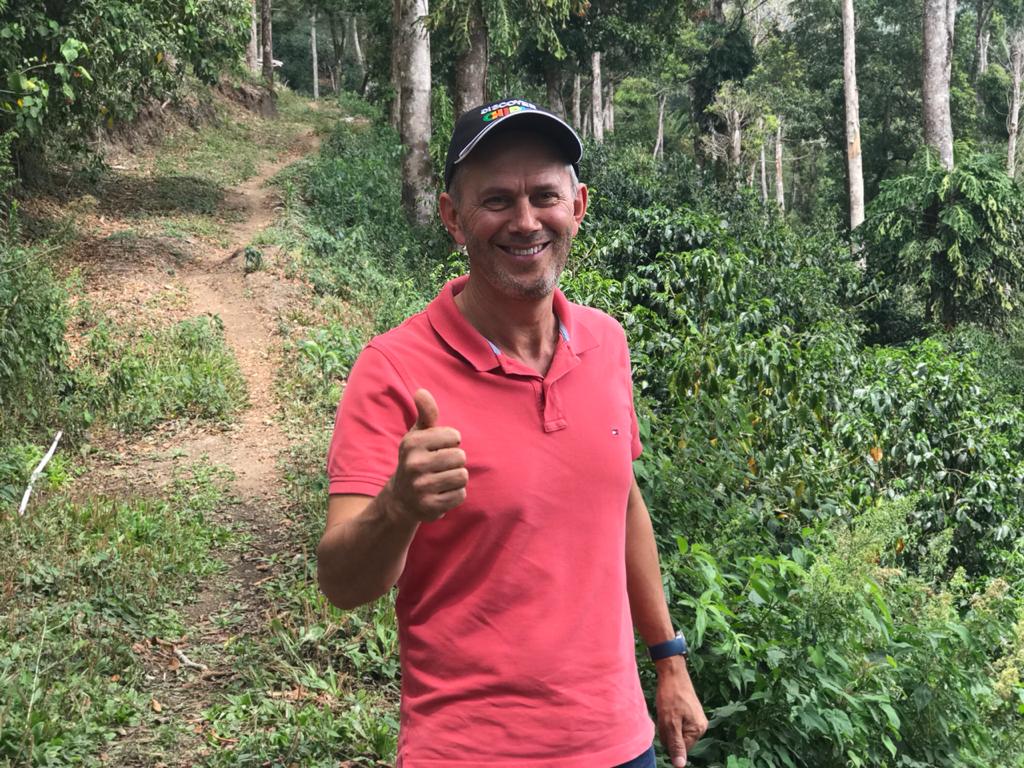Our special guest in this edition is a businessman who has been successful in the development of the coffee industry and its commercialization. A professional who is known for his ability to develop opportunities between the agricultural and tourism sectors.
After graduating in Agricultural Engineering at the Zamorano Institute in Honduras and getting a Master’s Degree in Agrobusiness at the University of Florida, United States, Ricardo Koyner returned to Panama and resumed his family-inherited seven hectares of coffee. An intrepid decision that has led him to develop and promote one of the most successful coffee companies in Panama: Kotowa Coffee.
Winner of national and international awards as a coffee producer and first President of the Association of Specialty Coffees of Panama, Ricardo Koyner talks exclusively with The Visitor- El Visitante about coffee, the path that Panamanian coffee has gone through, its current state and where it is going and driven by national tourism.

How is coffee helping to improve the tourist experience throughout our country?
“20 years ago coffee was considered an energy drink, today it is still an energy drink due to its stimulating effects, but in recent times it has become an experience. The success that Panama has had worldwide with Geisha coffee is not only due to the differentiated flavor that it has of flowers or particular red fruits (papaya, plum, etc.), it is due to the fact that the markets that value it generate a whole experience around the coffee drink that includes these aspects.”
Not only the flavor but the entire history of the farm that produces it, is very similar to the wine Industry where a good wine, which, although it has superior tasting notes, is also valued by the type of process, the place where it is produced, and the variables that determine the possible flavor that is generated in it, such as: climate, soil, and everything that is found in the area where it is planted that in different ways affects both the growth and the fermentation processes elements that generate potentials for differentiated flavors. So, all the coffee has become an experience, having won so many world competitions has helped Panama to lead that sensory experience a lot, turning coffee into a tourism ambassador of the country. The people who come to our country, who hear about the history of Panama and the success of coffee, feel attracted and look at the cup of coffee they drink with a different meaning and perepction.”

What ideas related to coffee can be adapted or modified to help in the development of tourism and our country brand?
“There are many things that are happening right now throughout the world in terms of coffee, the Geisha event in Panama made evident in many countries the importance of generating flavors, highlighting the terroirs where coffee is produced. There is a lot of experimentation around the processes to generate coffee drinks that have differentiated flavors. An area that will grow exponentially in the coming years. There are other things that also generate growth and where the experience can be enhanced and it has to do with nature with what is being done at the farm to produce not only sustainably, but there is a new term that is ‘regenerative agriculture’, because when it is done in a sustainable way is to do it throughout time without deteriorating the soil and the environment, but in the regenerative way we are improving the soil to return it to its original state or to states of biological and environmental enrichment around the area. Looking at production from a regenerative point of view is going to be an issue that is going to affect the international market because everyone is concerned about the environment.”

Is it also possible to position our coffee in more accessible levels within international markets to position it more broadly around world?
“Panama today is considered the elite country, the place of the best coffees in the world and when I am asked how this is evidenced, it is very simple, all countries generate internal competition for their best coffees, in Panama it is called Best of Panama. These blind competitions, where the winner is presented, are then auctioned to international markets. If the country that follows Panama in prices paid is selected, which can sometimes be Ethiopia, other times Guatemala, generally the highest price paid is $300 to $400 maximum . However, the coffee from Panama that won the competition last year or before last year fetched $2,500, which is seven or eight times higher than any other in the world. The problem is that many people do not know the success that Panama has abroad, but that is a success that is known by specialists. It’s like wine, good wines are known by the market that consumes these more specialized products, the rest know the slightly more commercialized brands, and in the same way it happens with coffee. This recognition is held by Panama in specialized coffee markets around the world. In Panama, people are beginning to learn more about this and that has made Panamanians choose to request and demand coffees with better tastings, which makes the experience better, not only for Panamanians but for any visitor. So the work that Panama has done in the last twenty-five years is the result of the decision of the Specialty Coffee Association to change the way we looked at coffee, we had to understand the market, our plantations and processes to be able to produce what we wanted, which is what the market really wanted…something special. So we approach the issue of how it turns towards the international market from the outside in. It has been 25 years of a lot of communication with the market, we visit many fairs, we bring and invite as a country many international connoisseurs. In itself, March is the season when hundreds of coffee connoisseurs visit the different farms in the highlands of Panama. What we have to do is not let us steal the errand because all the other countries aim to be able to achieve the success that Panama has had in the world market.”
You are part of the tourism value chain, what do you feel our tourism lacks in a structural and organizational way to develop and also promote star products such as coffee?
“It is necessary that the entire tourist offer in the country be brought together in a more organized way, this must be done by a government entity, and for that, the official tourist sectors of the country need to be depoliticized and professionalized. Once this is done, we then also need to promote and increase ease and mobility in order to bring more tourists to the interior. Many times there are two problems with the ease of tourism traffic: the air ticket is expensive, and often there is not the necessary flight frequency. During these high traffic days airlines don’t look inward, sometimes five or six days go by and no tickets are available. Airlines need to empower the destination. This entails a possible initial sacrifice as they have done in other countries where they put extra flights that are not filled at first but once the destination gets more popular, these flights increase, so we need to boost the frequencies and lower the cost of mobility to our destinations within the country.
We also need to better understand what our offer is segmented by type of offer, if it is beach, adventure, luxury tourism and each of the ways we currently generate tourism. We need more data, more tabulated information about what we have to be able to go outside and access these markets. We also have all the potential to generate gastronomic and cultural tourism. There are many more things that we could do, but we need to train our people so that they can offer interesting tourism packages at a good price and that can create a positive experience for tourists so that they are the one who really bring us more tourists.”
In what other ways can coffee be part of our current tourist offer that generate more value more quickly?
“Coffee can help generate more tourism if you can have a greater offer than just a cup of coffee. Rather, on a farm where there is coffee, there are also other experiences, be it bird watching, gastronomic tourism or some cultural experience tied to coffee. So we have to open the compass of the coffee theme to other forms of tourist experiences.
Having a trapiche and making cane or making cane candy, the managing of cattle, perhaps cheese, milk for the children so that they have the experience of learning how a cow is milked, there are many things that are done in the countryside that we could take from its form of production to a very similar system that adds vakue to the experience of the tourist.”

You are also involved in natural and adventure tourism, how can we promote it in a way that differentiates us from Costa Rica, and that makes you feel Panamanian?
“On the tourism adventure it is a bit the same, we have to broaden the range of what we offer, but it has to be interesting and safe. The problem we often have is that we want to do interesting things but without the security that tourists need. A tourist who comes to the countryside usually comes from the city where they do not understand how the countryside works and comes with concerns about animals or bites or a series of other things, so what we do has to include the safety of the tourist. In addition to the experience, security is part of it. In adventure tourism we could do many things, we only have to look at our neighbors and we can empower the entire region to moor it and add to all the offer we already have.
And we have to differentiate ourselves, but precisely our lack of tourist flow is an advantage because we should promote ourselves as unexploited destination. A country where nature is still virgin, so we have to highlight what makes us different, not what makes us alike as other destinations that are already known for that very reason, so in my opinion it is a matter of focus, but we also have to know how to say it. In communication, although it can be done through networks, in seminars, in conventions, our best communicator will always be the same tourist.”

What projects do you have planned in the near future for Kotowa coffee in Panama and internationally?
“In Kotowa we continue working with coffee but we have new projects, a couple of years ago we launched chocolate, we have a store, the farms in Bocas del Toro, a store in Boquete and possibly we are going to open some stores in Panama. We also have the chocolate factory in Boquete, but we are working on tea and this will probably be on the market in two or three months. The tea that comes from the Camelia Sinensis tea plant is a new tourist experience that we are opening. We are going to be putting it on the market very soon and it is going to be a new sensory experience and also an experimental experience worth the redundancy, where the tourist can go to the plantation, harvest its leaves and make their own tea. That is one of the things we have preparing for 2023.”







